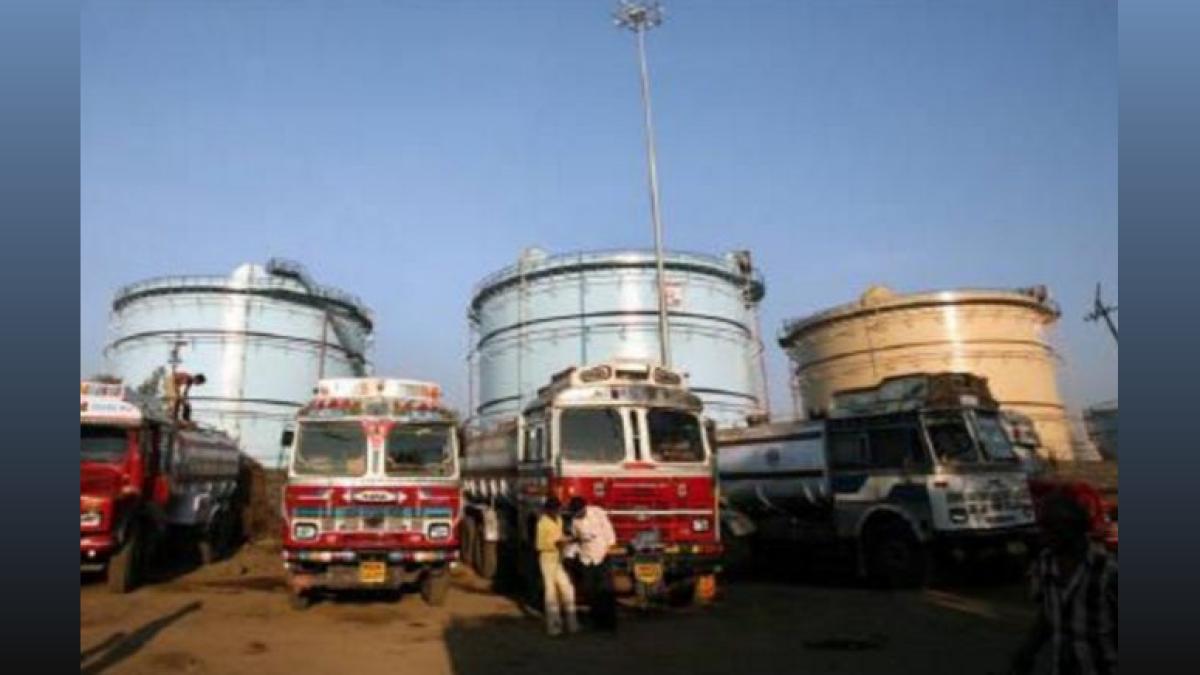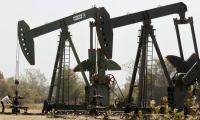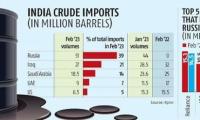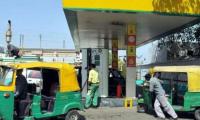Petroleum Pipeline Tariff Hike: Boost for IOC, Reliance
India's oil regulator raises pipeline tariffs for petroleum products like petrol and diesel, benefiting companies like IOC and Reliance. Learn about the new tariff structure and its impact.

New Delhi, Jul 26 (PTI) In a big boost to companies such as Indian Oil Corporation (IOC) and Reliance Industries Ltd, the oil regulator on Friday announced an upward revision in tariff for pipelines that transport petroleum products like petrol and diesel.
The Petroleum and Natural Gas Regulatory Board (PNGRB) indexed tariffs for legacy pipelines at 75 per cent of the basic railway freight plus a one-time escalation of 17 per cent and a 3.4 per cent annual escalation from the 2025-26 fiscal, according to a statement issued by the regulator.
For pipelines commissioned after PNGRB in 2010 issued tariff regulations, the transportation tariff will be based on discounted cash flow (DCF) methodology with 12 per cent post-tax returns on capital employed over the economic life of the pipeline.
For pipelines built after interested companies participated in a bidding process to win the rights, the tariff for the first 10 years will continue to be the one bid by the operator in the tender.
From the 11th year, the tariff will be determined based on the DCF methodology with a 12 per cent return over the remaining economic life of the pipeline.
In the statement, PNGRB said the new tariffs will come into effect from August 1.
"PNGRB is mandated under the PNGRB Act to authorise petroleum products and natural gas pipelines. The board approves regulations to determine the tariff for third party users of the 'common carrier' pipelines," it said.
Unlike natural gas for which tariff regulations were first issued in 2008, for petroleum product pipelines, the Board has been relying on Railway tariff for movement of petroleum products by rakes to fix the pipeline tariffs.
After an intensive exercise, the board has notified independent yardsticks for pipeline tariffs.
There are three kinds of petroleum product pipelines in existence -- non-bid pipelines commissioned before the notification of petroleum product pipeline tariff regulations 2010 i.e. before December 20, 2020 (called legacy pipelines), non-bid pipelines commissioned after the PPPL tariff regulations 2010, and bid-out pipelines authorized prior to PNGRB Amendment in PPPL Authorization Regulations, 2023.
These tariffs were established by benchmarking against alternate transportation mode of railways at 75 per cent of the rail tariff except for LPG, wherein it was set at 100 per cent of the rail tariff, based on the equivalent rail distance along the pipeline route.
"However, railway goods rates have not been revised since 2018, the pipeline tariffs based on these rates have not accounted for inflation during this period. Moreover, Indian Railway freight runs on a macro-economic model and does not account for the costs incurred by pipeline entities. There is also no assured rate of return in railway tariff. Due to the above reasons, there has been a need to frame an independent basis to fix pipeline tariff for petroleum products," PNGRB said.
For legacy pipelines, "the transportation tariff for petroleum products (other than LPG) shall be 75 per cent of basic railway freight and for LPG 100 per cent of basic railway freight... with a one-time escalation of 17 per cent effective from the date these regulations come into force till March 31, 2025. Thereafter, w.e.f. financial year 2025-26 i.e. from April 1, 2025, annual escalation @3.4 per cent shall be considered based on 10 years' CAGR of WPI on rolling basis unless there is change in the said WPI by 0.5 per cent on either side," it said.
Additionally, these pipelines have been provided with a one-time option to get the tariff determined based on DCF method, in case they incur capex on its replacement, expansion or augmentation.
For the pipelines commissioned after the PPPL tariff regulations 2010, the transportation tariff shall be determined based on the DCF methodology with 12 per cent post tax returns on capital employed over the economic life of the pipeline.
"This is consistent with the methodology of natural gas pipelines," it said.
For bid-out pipelines, "the transportation tariff shall be determined based on the DCF methodology with 12 per cent returns over remaining economic life of the pipeline considering the Net Fixed Asset (NFA) as at the beginning of the 11th year of operations," it said.
"Post PNGRB authorization amendment regulations, bidders have to quote tariffs for the entire life of 25 years."
These regulations will come into effect from August 1, 2024.
PNGRB Chairperson Anil Kumar Jain said this reform aims to provide the financial stability and attractiveness needed to boost pipeline infrastructure growth in India.
"By prioritising pipelines, the most efficient transportation mode, this initiative will help alleviate road congestion, minimize accident risks, and reduce pollution from road transport. Additionally, the new tariffs will benefit consumers by offering a more economical alternative to road transportation for moving goods, embrace the change and support a greener, safer, and more efficient future for petroleum transportation in India and is a step towards vision 2070 of the Govt of India," he said.
The Petroleum and Natural Gas Regulatory Board (PNGRB) indexed tariffs for legacy pipelines at 75 per cent of the basic railway freight plus a one-time escalation of 17 per cent and a 3.4 per cent annual escalation from the 2025-26 fiscal, according to a statement issued by the regulator.
For pipelines commissioned after PNGRB in 2010 issued tariff regulations, the transportation tariff will be based on discounted cash flow (DCF) methodology with 12 per cent post-tax returns on capital employed over the economic life of the pipeline.
For pipelines built after interested companies participated in a bidding process to win the rights, the tariff for the first 10 years will continue to be the one bid by the operator in the tender.
From the 11th year, the tariff will be determined based on the DCF methodology with a 12 per cent return over the remaining economic life of the pipeline.
In the statement, PNGRB said the new tariffs will come into effect from August 1.
"PNGRB is mandated under the PNGRB Act to authorise petroleum products and natural gas pipelines. The board approves regulations to determine the tariff for third party users of the 'common carrier' pipelines," it said.
Unlike natural gas for which tariff regulations were first issued in 2008, for petroleum product pipelines, the Board has been relying on Railway tariff for movement of petroleum products by rakes to fix the pipeline tariffs.
After an intensive exercise, the board has notified independent yardsticks for pipeline tariffs.
There are three kinds of petroleum product pipelines in existence -- non-bid pipelines commissioned before the notification of petroleum product pipeline tariff regulations 2010 i.e. before December 20, 2020 (called legacy pipelines), non-bid pipelines commissioned after the PPPL tariff regulations 2010, and bid-out pipelines authorized prior to PNGRB Amendment in PPPL Authorization Regulations, 2023.
These tariffs were established by benchmarking against alternate transportation mode of railways at 75 per cent of the rail tariff except for LPG, wherein it was set at 100 per cent of the rail tariff, based on the equivalent rail distance along the pipeline route.
"However, railway goods rates have not been revised since 2018, the pipeline tariffs based on these rates have not accounted for inflation during this period. Moreover, Indian Railway freight runs on a macro-economic model and does not account for the costs incurred by pipeline entities. There is also no assured rate of return in railway tariff. Due to the above reasons, there has been a need to frame an independent basis to fix pipeline tariff for petroleum products," PNGRB said.
For legacy pipelines, "the transportation tariff for petroleum products (other than LPG) shall be 75 per cent of basic railway freight and for LPG 100 per cent of basic railway freight... with a one-time escalation of 17 per cent effective from the date these regulations come into force till March 31, 2025. Thereafter, w.e.f. financial year 2025-26 i.e. from April 1, 2025, annual escalation @3.4 per cent shall be considered based on 10 years' CAGR of WPI on rolling basis unless there is change in the said WPI by 0.5 per cent on either side," it said.
Additionally, these pipelines have been provided with a one-time option to get the tariff determined based on DCF method, in case they incur capex on its replacement, expansion or augmentation.
For the pipelines commissioned after the PPPL tariff regulations 2010, the transportation tariff shall be determined based on the DCF methodology with 12 per cent post tax returns on capital employed over the economic life of the pipeline.
"This is consistent with the methodology of natural gas pipelines," it said.
For bid-out pipelines, "the transportation tariff shall be determined based on the DCF methodology with 12 per cent returns over remaining economic life of the pipeline considering the Net Fixed Asset (NFA) as at the beginning of the 11th year of operations," it said.
"Post PNGRB authorization amendment regulations, bidders have to quote tariffs for the entire life of 25 years."
These regulations will come into effect from August 1, 2024.
PNGRB Chairperson Anil Kumar Jain said this reform aims to provide the financial stability and attractiveness needed to boost pipeline infrastructure growth in India.
"By prioritising pipelines, the most efficient transportation mode, this initiative will help alleviate road congestion, minimize accident risks, and reduce pollution from road transport. Additionally, the new tariffs will benefit consumers by offering a more economical alternative to road transportation for moving goods, embrace the change and support a greener, safer, and more efficient future for petroleum transportation in India and is a step towards vision 2070 of the Govt of India," he said.
You May Like To Read
TODAY'S MOST TRADED COMPANIES
- Company Name
- Price
- Volume
- Vodafone-Idea
- 11.96 (+ 5.75)
- 113885452
- Sylph-Industries
- 0.77 ( -1.28)
- 51063360
- Mangalam-Industrial
- 0.90 ( -1.10)
- 39473361
- Shish-Industries
- 14.02 ( -9.96)
- 38945873
- Ola-Electric-Mobilit
- 34.40 (+ 9.97)
- 38895972





